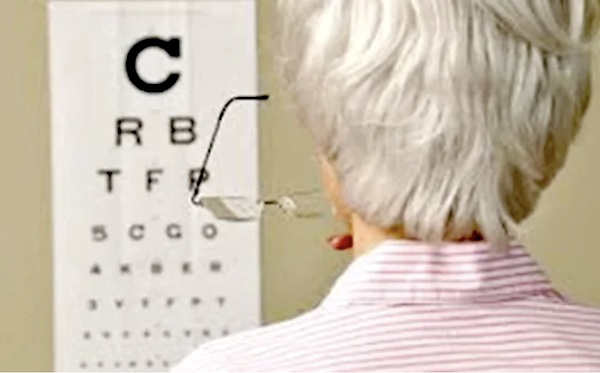Vision Screenings for Driver’s License Renewals Will Be Required in 2025 to Enhance Driver Safety
New vision screening law starts January 1 for all Kentucky license holders
FRANKFORT, Ky. (Sept. 19, 2024) – Few things are more important for safe driving than good eyesight. That’s why vision screening will be required in Kentucky next year for anyone renewing a Kentucky driver’s license. This new requirement, enacted during the 2021 General Assembly, aims to promote highway safety by ensuring that all drivers maintain good vision throughout their driving career.
Starting January 1, 2025, all Kentuckians must undergo a vision screening to renew their license. Multiple states also have adopted mandatory vision screenings, including Indiana, Ohio and Missouri, to ensure drivers have the visual acuity required to operate a vehicle safely.
“Driving is a privilege many of us enjoy and this best practice is one way we look out for each other on the road to make our highways safer for everyone,” said Gov. Andy Beshear.
House Bill 439, signed into law by Gov. Beshear after the state legislature passed it three years ago, now takes effect on January 1, 2025. Key details of the new vision screening process include:
- Vision screenings can be completed at no cost at any Kentucky Transportation Cabinet (KYTC) Driver Licensing Regional Office at the time of license renewal and, on average, takes less than 1 minute to complete.
- Drivers also have the option of conducting a vision exam with their vision specialist (optometrist/ophthalmologist), or a vision screening with a KYTC-credentialed osteopath, physician, or advanced practice registered nurse in advance of their license renewal visit. Starting in 2025, upon request, the medical professional will complete an approved state-issued form that they will give to the patient if they pass. The patient may bring the form to their license renewal visit if the form and exam were completed within 12 months of the license renewal visit. The driver will not need to take a vision screening at a regional office.
- If a driver does not pass the vision screening at a regional office, they will be instructed to see a vision specialist for corrective measures before proceeding with license renewal.
- Kentuckians are encouraged to bring corrective lenses if conducting a vision screening at a regional office. A restriction will be placed on your license if you pass the vision screening while wearing glasses.
- Vision screenings can only be performed once at a regional office during each renewal cycle.
- Online and mail-in driver’s license renewal will still be available after Jan. 1, 2025 for Kentuckians who choose to complete a screening with a vision or qualifying medical specialist. The cardholder simply needs to upload the official, signed form provided by their medical professional when renewing on drive.ky.gov.
“We know this will be a change for license holders when it’s time to renew every four or eight years, but it’s a measure driven by safety, and that’s something we can all get behind,” said Transportation Cabinet Secretary Jim Gray. “People are the most precious cargo on our roads.”
Existing state law allows Kentuckians to renew their driver’s license up to 180 days (roughly 6 months) before their card expiration date. It is strongly advised to renew early should any corrective measures be needed to improve vision while their license is still valid. During every renewal cycle for drivers 21 years of age or older, cardholders have the option of choosing a driver’s license valid for four or eight years.
Appointments for license renewals are strongly encouraged to minimize wait times, although walk-ins will still be accommodated. No separate appointment is needed for the vision screening.
“Clear vision is essential for making safe decisions on the road,” said Kentucky State Police Driver Testing Branch Commander Captain Chris Baker. “Mandatory vision screenings have been a longstanding requirement for all first-time drivers and expanding this to all drivers is a practical way to make roads safer for everyone.”
“Comprehensive eye exams are crucial for detecting impairments that could compromise driving ability, while also detecting other serious health conditions,” said Leslie Cecil, O.D., President of the Kentucky Optometric Association. “This new vision screening requirement is a significant step in safeguarding public health and road safety. Our organization looks forward to collaborating with the Transportation Cabinet and other vision specialists to help implement these new requirements.”
“The Kentucky Academy of Eye Physicians and Surgeons (KAEPS) supports the new requirements for vision screening in order to get a driver’s license in the Commonwealth,” said John Franklin M.D., President of KAEPS. “Our association believes it will keep Kentucky’s roads safer and ensure individuals get the vision care they need. We also appreciate the t Administration’s commitment to implementing the legislation in a way that helps the public understand the new requirements, why they are needed and how to comply. Our physicians will continue to work closely with the Administration and legislators as the new rules take effect.” –
The Education and Labor Cabinet’s Office of Vocational Rehabilitation’s (OVR) existing Bioptic Driving program helps eligible Kentuckians with certain visual impairments earn their drivers’ licenses. Using a combination of regular eyeglasses and a small telescopic lens system, bioptic driving improves the driver’s distance vision, allowing them to meet the state vision test requirements to safely operate a vehicle. To learn more about the qualifications and requirements for participation in the Bioptic Driving Program, check out this short video or visit OVR’s website.
For more information on the new vision screening requirement and how to prepare for your driver’s license renewal, visit drive.ky.gov/visionscreening. Kentucky CDL carriers with a valid, unexpired license are exempt from conducting a vision screening when renewing their license as their annual required medical certification process includes vision screening.
















